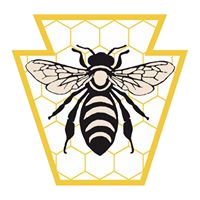Apiary Registration
Pennsylvania requires that every beekeeper in the Commonwealth be registered. The registration costs $10.00 for a two calendar-year period and covers all apiaries and hives owned by that person. The PA Department of Agriculture now offers online apiary registration. Detailed instructions are available. Alternatively you may still use the Mail-In Apiary Registration form.
Remember that all packages and hives that are brought into the Commonwealth must have a certificate of inspection.
The first law regulating beekeeping in the Commonwealth was passed in 1921. This law was passed primarily in response to a major outbreak of a highly contagious and lethal honey bee disease - American Foulbrood (AFB). Initial efforts of the Apiary Inspection Program focused on moving colonies from old fashioned "log" and "box" hives - which could not be inspected for disease, into modern movable frame hives. Apiary inspectors also educated beekeepers on the proper control and prevention of bee diseases.
PA Bee Laws and the Inspection Program
The current Bee Law, passed in 1994, was a collaborative effort between the Pennsylvania State Beekeepers' Association and the Pennsylvania Department of Agriculture's Bureau of Plant Industry. To increase efficiency of the inspection service, the new law required all apiaries in the state to be registered. The cost of registration is $10 for two calendar years.
The Bee Law continues to regulate the movement of honey bees, queens, and equipment into Pennsylvania in order to mitigate bee disease outbreak.
Each year a team of apiary inspectors inspect colonies throughout Pennsylvania during the active bee season (approximately mid-March through October). One of the main goals of the apiary inspection program is to determine the health of the honey bee colonies. When an inspector finds or suspects a case of American Foulbrood (AFB), the apiary containing the colony is quarantined as samples are processed in Harrisburg to confirm infection. Beekeepers are notified of the diagnosis and, if positive, are provided a treatment order outlining treatment options that must be completed within 14 days of receiving the order. Apiary Inspectors will return to inspect the formerly infected apiaries for two years. In addition, they will reach out to beekeepers within a three-mile radius of the infected apiary, inspecting those colonies as well.
The Apiary Inspection Program also provides certification inspections for queen and/or nuc producers. The program also provides migratory beekeeping operations the certification they need to facilitate the safe and timely movement of bees in and out of the Commonwealth.
The PA Department of Agriculture’s Bureau of Plant Industry does not have any regulations governing the sale of honey. This is regulated by the PA Department of Agriculture’s Bureau of Food Safety (link: Food Safety )(717-787-4315 or RA-FoodSafety@pa.gov , noting in email Attn: Manufactured Food Program Specialist). You may find additional information about honey sales and regulations here:
Read the PA Bee Law
Contacts
Karen Roccasecca
Pennsylvania State Apiarist
Email: kroccasecc@pa.gov
(717) 346-9567



